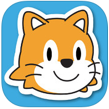4 Coding Apps For Kindergarten and Elementary School
- By

- 11/20/14
Common Sense Media’s service Graphite, which offers independent ratings and reviews of learning apps and websites, has compiled this list of apps to get young students started on the road to coding. For complete reviews, and for each app’s "Learning Rating," visit the Graphite website.
 ScratchJr
ScratchJr
Grades: K through 2
Price: Free
Concepts: Digital creation, logic, combining knowledge
ScratchJr's icon-driven interface is a good fit when the goal is introducing kids to programming concepts without all the complex programming. The interface does take some time to figure out: It's not as simple as handing the program to a classroom of kids, but with a little teacher guidance, ScratchJr offers a rich and challenging environment for very young programmers. Read the full Graphite review.
 Kodable Class
Kodable Class
Grades: K through 5
Price: $5 per month for three classes and up to 50 students
Concepts: Patterns, problem-solving, thinking critically
Teachers often worry about how they can teach a concept like computer programming if they don't fully understand it themselves. The curriculum included with Kodable Class can help teachers learn the lingo along with the kids . And while kids won't be learning to code just yet, they'll develop the logic and problem-solving skills necessary to succeed as programmers — skills that will serve them well everywhere. Read the full Graphite review.
 Lightbot Jr 4+ Coding Puzzles
Lightbot Jr 4+ Coding Puzzles
Grades: 1 through 3
Price: $2.99
Concepts: Decision-making, solving puzzles, sequences
For the teacher looking to provide a savory taste of what computer programming is like, Lightbot Jr is a perfect snack. Puzzles present kids with a cute little robot, small levels comprised of blocks and a handful of drag-and-drop programming icons. Lightbot Jr's available commands include move, turn, light and jump. And when the player places these command tiles in a row, LightBot Jr moves merrily through the level, lighting up designated tiles. Read the full Graphite review.
 Hopscotch
Hopscotch
Grades: 2 through 8
Price: Free
Concepts: Strategy, digital creation, logic
Kids can learn the fundamentals of computer programming on a mobile device with Hopscotch. Using visual blocks that represent programming concepts, students can create games, animations, fun messages and more. Kids are exposed to the ideas they'll use when programming with more sophisticated languages without worrying about the minute details just yet. Read the full Graphite review.
About the Author
Common Sense Education helps educators find the best edtech tools, learn best practices for teaching with tech, and equip students with the skills they need to use technology safely and responsibly. Go to Common Sense Education for free resources including full reviews of digital tools, ready-made lesson plans, videos, webinars, and more.